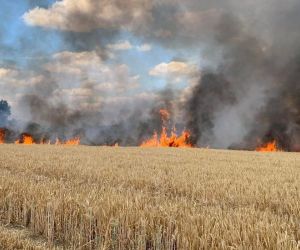Probie II

“Jump in back!” Random midweek afternoon, and I could be at Village Hall at my desk. But I’m not. I’m in a field next to another field on fire, running toward Brush 36. “Running” might be a bit of a misnomer, as I’ve got my full bunker gear on. Until that last brush with mortality rendered the left big toe inoperable, I was always the fastest guy on any team I was on. Centerfield, free-safety, kick return … those were my stations in life. Running to make plays. Running to stop the opponent. Running from the cops. Those were the days.
These days a probie, running toward a fire. That day taking direction from Captain Aldridge, after I commandeered a sheriff’s squad and had him drive me out to where the action was. Arriving on scene with Mitch in Tender 35, the fire was out there, and you can’t put it out until you get to it, so Deputy, let’s GO!
If you don’t start your time in a fire department with an omnipresent sense of imposter syndrome, there’s something wrong with you. Throwing the gear on, jumping in the back of the big red thing and heading out to who knows what with sirens blaring and lights flashing is one thing. Knowing what the hell to do when you arrive is a whole different thing. If you’re not aware of the difference between those two things, only bad stuff happens. So I read and watch everything I can, and pay rapt attention to orders.
Having jumped in and out of the big red things in all weather conditions and hours of the day and night for several months now, the imposter syndrome is slowly receding. It’s not all a blur of sound, red lights and shouted instructions as we head towards some things I actually know. Certainly, while running toward the fire, I didn’t feel at all like an imposter. I felt like me. Something dangerous … something difficult … for the public good? Let’s go. There’s no more socially acceptable way to do risky stuff than being a firefighter.
Everyone is wired a little differently, and running away from fire is a perfectly acceptable life choice. But the running toward it (with good gear on, on a close-knit team) is more than a little addictive. The pager starts beeping and you start going – connecting to a purpose beyond yourself. It’s tremendously rewarding so, if you think you might be able to help on a volunteer department, give it a try.
The adrenaline spike and the sheer public good of it is part of the happiness, but the camaraderie of the team is an even bigger part. I suppose pickleball doubles or playing bridge is more age-appropriate team behavior these days, but there’s not a lot of danger, difficulty or public good in those. So, while the legs, lungs and arms hold up, it’ll be firefighting.
It’s not all adrenaline and smart choices, of course. Running out to Brush 36 to get into the fight was huge fun, as was stopping the fire from consuming the farmer’s entire field on a hot and windy day. Poynette Fire did good work that day, called to help, along with DNR, by Arlington Fire. I did what I could, and came back to the station filthy enough for Chief Radewan to say, “looking good, Buddy”.
But … just to reinforce how much I still have to learn, when the Captain shouted, “Jump in back!”, he did not mean jump in the back of the pick-up truck, stand atop the water tank and fire up the pump to start operating the hose like the .50 calibers on PT109 as the truck dashed through waves of flames. So … sheepishly but promptly, I climbed off the water tank and got in the back seat instead.
I'm an idiot.
Sorry, Captain.
Awaiting your next order.

